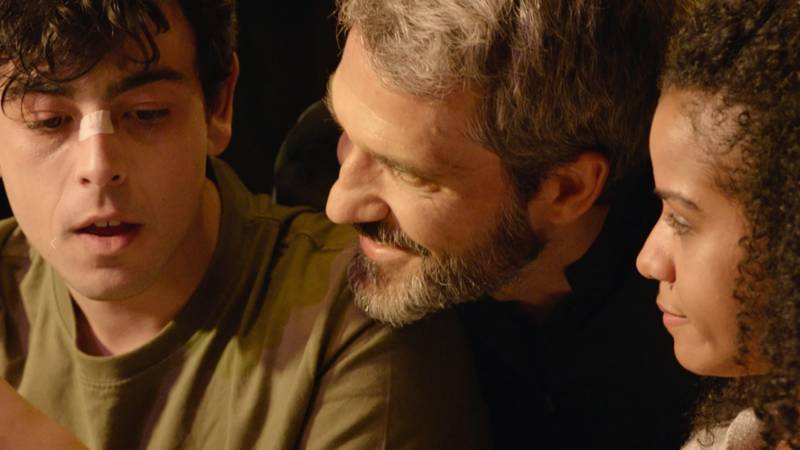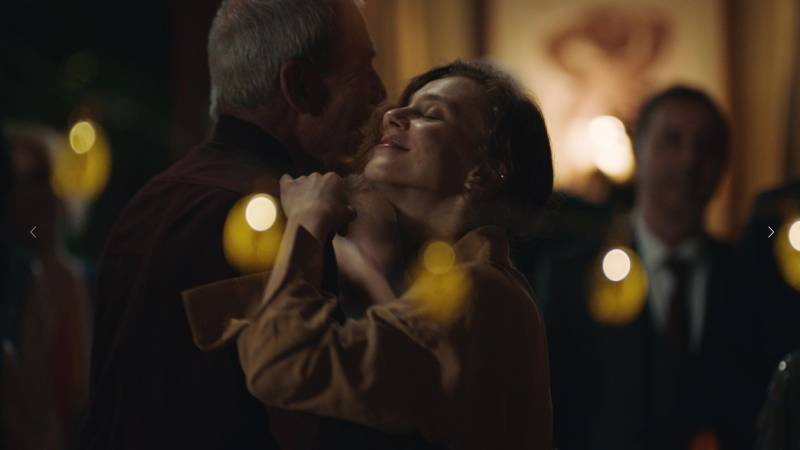






































This was DMovies‘ sixth consecutive year at Tallinn Black Nights, but not only was it my first time at the Festival, it was my first time in Estonia (I have been lending a hand with remote coverage of the event for many years). I worked beside two DMovies journalists on site, Victor Fraga and Jeremy Clarke, trailing through the garden of cinema. On the third night of the Festival, the three of us met for a drink, exhibiting very differing opinions on what we consider to be a strong example of cinema. Like all art forms, cinema should demand an intellectual, emotional and comprehensive opinion from the viewer. The best of art elicits a diversity of opinion, which is fitting for this festival, because the work was so organic and diverse in its nature.
Falling Into Place (Aylin Tezel; pictured just below) was the most impressive film that I watched, largely because the story was so well poised: it was like watching a novel unfold on the big screen. I was delighted to see Aylen Tezil receive an award for her craft, which was presented to her by a jury of critics. Mo Mamma (Eeva Mägi), a very unusual Estonian “horror”, and Tentigo (Ilango Ram), a hilarious Sri Lankan comedy about a corpse with a boner were deservedly mentioned at the ceremony (awarded them five and four splats respectively). I was not entirely convinced by top choice for First Feature, The Moon is Upside Down (Loren Taylor). The juries saw as a strength what I set out to criticise: very fragmented individual stories are pieced together in order to create an emotional crescendo. Diversity of opinion makes it art.
I was surprised that Endless Summer Syndrome (Kaveh Daneshmand) did not win an award, either for acting or directing, because it was an accomplished effort for both. Sophie Colon brought an authentic element to the proceedings, and I was stunned at her commitment to the practice. You could feel her despair, anguish, horror at various points during the film. Like Falling Into Place, Endless Summer Syndrome worked because it was gingerly handcrafted, and the many parts gelled together. No directorial flourish was put in without some clear, well thought-out reason, and that included nudity. Both Tezlin and Colon appear without clothing in their films, but in Tezlin’s case, it was to highlight her character’s fear of intimacy following a difficult breakup, and in Colon’s case, it was to demonstrate that her character had indeed given birth, despite adopting two children afterwards.
Fellow DMovies writer Paul Risker gave me a little hand by reviewing the playful Spanish drama The Quiet Maid (Miguel Faus, pictured above).

.
Different beasts
This might explain why Cat Call (Rozália Szeleczki) and Body Odyssey (Grazia Tricarico) did not reach their full potential.,did not fully work. They highlighted cinematic interpolations above the narrative beats of the story. The plot of Cat Call was flimsy, while Body Odyssey‘s was difficult to understand, and I suspect the dream sequences which featured in both films were produced in the hope of fattening up the work. As Sir Sam Mendes says, a good film must start with a good script.
Storytelling isn’t everything, which was extremely apparent in Mr and Mrs.Stodola (Petr Hátle) and The Fisherman’s Daughter (Edgar de Luque Jácome). Both films were largely static in their resolve. There were few stamps of artistry and limited cinematic ingenuity, just a faithful re-telling of script to screen. The Fisherman’s Daughter closed with a beautiful sequence filmed entirely underwater, melding creature with swimmer in one large underwater paradise.)
Dilli Dark (Dibakar Das Roy) was a bold, vibrant work that was suffused with colour and candour. It boasted an impressive colour palette, which was a direct contrast to Unmoored (Caroline Ingvarsson), a convoy of grey hues and sadder, more forlorn styles.Vera and the Pleasure of Others (Romina Tamburello and Federico Actis) was an enjoyable sex romp, utilising a series of singular moans, bolstered by some sterling performances. Playful, pitiful and very, very sexy. And then there was Inpaintings (Ozan Yoleri; pictured below), an impactful visual diary about a young woman embracing her life’s purpose, shot against the blistering hot Turkish skies.
These films gleamed with sense of originality and flair. A selection of 16 films directed with passion and a creative vision. None were directed without vigor, or with poor intentions. A labour of love.

.
Beyond First Feature
Outside of the First Feature category, I was exposed to films in other categories, and of this selection, The Peasants (DK Welchman & Hugh Welchman) was the most ambitious. A story of earthly lust, it was bolstered by a painting technique, that highlighted the book’s aestheticism and sense of geography. Elsewhere, The Ghosts Cult And Big Brother: Mad On The Final Black Night (Green Geng) – interminably long title notwithstanding – made a compelling case against war using a dreamlike structure.
Due to time constraints, I didn’t get to explore any neighbouring towns (something for next time, perhaps), but Tallinn left an incredible impression on me. Buildings loom over citizens, strolling from destination to destination, the art peering over them like a friendly, familiar face. Passages and cobble intertwine, reminding humanity of their humble beginnings. A beautiful city. Boy oh boy, do I want to go back to.
















